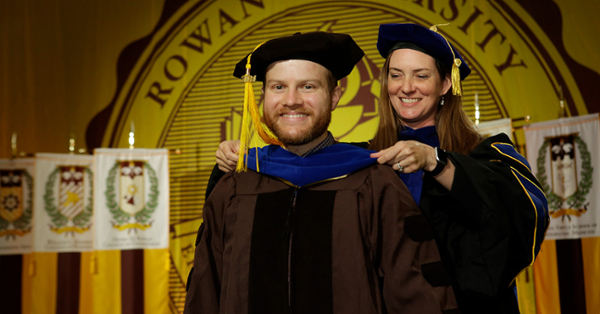Another Rowan milestone: First Ph.D. graduates from new complex biological systems program
Another Rowan milestone: First Ph.D. graduates from new complex biological systems program

Rowan University’s new complex biological systems program has produced its first Ph.D., marking another milestone in its fast-rising research portfolio. Dr. Graham Davis of Philadelphia successfully defended his dissertation this January under the guidance of Dr. Maggie Panning Pearce, associate professor of biological and biomedical sciences in the College of Science & Mathematics. Davis formally received his hood on Friday during Rowan's inaugural Hooding Ceremony.
Results from their research examining how Huntington’s disease spreads in the brains of affected individuals have been published online by the Journal of Neuroscience, a leading journal in brain research.
Davis spent six years with Pearce studying the inherited neurodegenerative disease using Drosophila melanogaster, commonly known as the fruit fly. In the brains of flies expressing the gene that causes Huntington’s disease, he found that glia cells, which make up roughly 50% of the human brain, slowly lose their ability to clear out debris from degenerating neurons.
The study found that, over time, glia end up spreading clumps of misfolded proteins in the brain. The research team also identified a novel protein in glia that’s necessary for spreading or propagating these misfolded proteins, known as aggregates.
The study points toward the potential for new drugs that could limit disease spread, as well as possible cell and gene therapies to replace dysfunctional glia in the brains of patients.
“These kinds of medical advances can’t occur unless we understand the fundamental biological mechanisms that cause disease,” said Davis, who presented his findings in October 2023 before over 500 neurobiologists at a conference held at Cold Spring Harbor Laboratories in Long Island, New York.
Introduced at Rowan in fall 2023, the complex biological systems doctoral program allows students to explore questions on the molecular, cellular, organismal and systemic levels, using advanced techniques in interdisciplinary scientific and computational fields. The program is designed to prepare the next generation of biological scientists.
In recent decades, biologists have made so many discoveries about the natural world that they have transformed their own field. While scientists are still interested in identifying and describing the basic functions of molecules, cells and organisms, many researchers are now investigating how biological systems interact with one another at multiple levels.
It’s a flexible program, since the complex systems approach can be applied to many different aspects of biology, from neuroscience to genetics to cell biology to biophysics. Graduates are equipped to enter academia to teach and perform research; work in biotechnology and pharmaceutical industries; or scientific policy, such as at the National Institutes of Health; among many other career paths.
“Students in this program develop skill sets that range from asking specific questions at the molecular and cellular level all the way up to how to frame their hypotheses at larger scales,” said Pearce.
Davis and Pearce joined Rowan in fall 2023. Described by his advisor as a team player and an excellent mentor, he was instrumental in helping Pearce set up her new lab spaces in Science Hall.
Ultimately, Davis hopes to land a position in the area’s biotechnology or pharmaceutical industries.
“The thing I want the most is to help develop new therapies and new products that can change people’s lives,” Davis said.